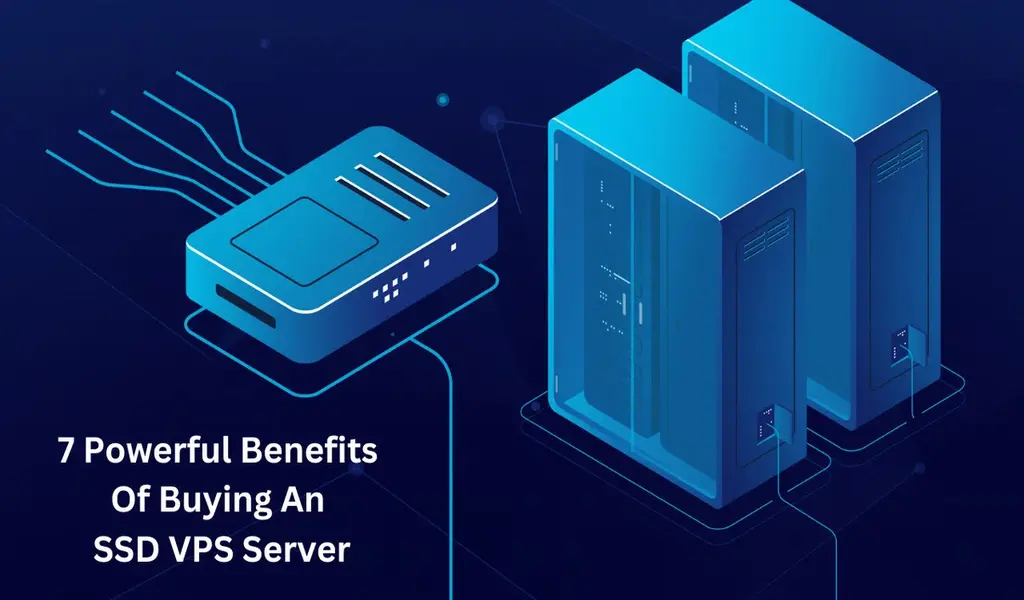Tech
7 Powerful Benefits Of Buying An SSD VPS Server

Are you tired of sluggish VPS performance? Do you want to take your website or application to the next level?
If so, it’s time to consider upgrading to an SSD VPS. With lightning-fast speeds and unbeatable reliability, SSD VPS Servers are quickly becoming the go-to choice for businesses and individuals alike.
In this article, we’ve got Abhishek from RDP Arena to share his expertise on the 6 powerful benefits of choosing an SSD VPS. With over a decade of experience in the VPS (Virtual Private Server) hosting industry and a track record of satisfying more than 50,000 clients, you can trust his advice.
From lightning-fast speeds to robust reliability, there’s a lot to get excited about. But we don’t want to spoil all the surprises just yet. So, if you’re ready to discover how an SSD VPS can supercharge your online presence, keep reading.
What are Solid State Drives (SSD)?
SSDs (Solid-state Drives) are a new type of storage device that you can use to store your files, pictures, music, videos, and other data on your computer or server.
Unlike traditional Hard Disk Drives (HDDs) that use spinning disks and a needle to read and write data, SSDs use a more modern NAND flash memory technology, making them swifter and more durable than HDDs.
Why Should You Choose A SSD VPS?
If you want your VPS to be fast, efficient, and reliable, Solid State Drives (SSDs) are the way to go. These drives are designed to optimize speed, storage, and performance, all of which are essential for high-quality VPS hosting.
On the other hand, if you choose a VPS with a traditional HDD, it might slow down over time. Additionally, if your provider oversells their disk space, it could further deteriorate performance due to over-usage.
What Are The Benefits Of A SSD VPS?
Having a VPS powered by SSD provides significant advantages for your hosting experience.
In this section, we’ll explore the six fundamental benefits of having an SSD Drive on your VPS:
1. Improved Performance: One of the most significant benefits of SSDs is their noticeable performance improvement.
Unlike traditional HDDs, which use rotating disks to read and write data, SSDs use flash memory. This technology results in faster data access and retrieval times, which ultimately helps your website or application run more efficiently.
In addition to that, SSDs also bring higher data transfer speeds to the table, allowing your server to handle multiple tasks and data-intensive jobs simultaneously. Whether you’re uploading files or downloading important data, it’s all done in a snap, boosting your productivity.
But that’s not all! SSDs also provide a significant advantage for database-driven applications hosted on your VPS. Due to their faster data access times, SSDs can handle more simultaneous database transactions than traditional HDDs. This means your web applications will perform more efficiently, even during peak traffic times.
2. Reduced Latency: Another advantage of using SSDs in a VPS is the reduction in latency.
Latency refers to the delay between a user’s action and the server’s response. Since the data is retrieved almost immediately with SSD, it ensures that when your visitors click on things or interact with your site, they get a lightning-fast response – no annoying waiting times!
This speedy response time is not just great for your visitors’ experience but also gives your website’s search engine rankings a boost by reducing your TTFB (Time to First Byte).
Also, low latency can be particularly beneficial if you use your VPS for forex trading. It ensures that your trades are executed promptly and accurately, which can help maximize your profits.
3. Enhanced Reliability: Using SSDs in your VPS can offer enhanced reliability compared to traditional HDDs.
Since SSDs have no moving parts, they are less prone to mechanical failure, which makes your server more stable and secure.
With their robust design, SSDs are also better suited to withstand physical shocks, temperature changes, and other environmental factors that might be prevalent in a datacenter. This can help ensure your VPS performs reliably and your data remains safe and secure over time.
This rock-solid reliability is also incredibly beneficial for certain applications that demand constant uptime and top-notch performance. For example, suppose you’re using OBS streaming apps or Forex algo trading apps. In that case, SSDs can ensure your VPS stays online and accessible at all times.
4. Energy Efficiency and Sustainability: Unlike traditional HDDs, SSDs don’t have any moving parts. This means they require less power to operate, which is great for saving energy.
On top of that, SSDs also produce less heat than HDDs, so they don’t require as much cooling. This further reduces energy consumption and lowers your VPS provider’s carbon footprint.
Another fantastic benefit of SSDs is that they have a longer lifespan than HDDs, meaning fewer drives need to be replaced, contributing to less electronic waste.
As we all become more conscious of our environmental impact, choosing SSDs is a smart choice. They not only offer better performance but also play an indirect role in preserving our environment for the future.
5. Better Price-Performance Ratio: Using an SSD VPS might require a slightly higher initial investment than traditional hard drives. However, it can offer a better price-performance ratio in the long run.
An SSD can read up to 10 times faster and write up to 20 times faster than a standard HDD. A serious performance boost like this in a VPS environment can translate into improved application performance and higher website user satisfaction. This can further lead to increased customer retention and higher revenues for your business in the long term.
Also, with an SSD VPS, you can ensure that your server can handle more requests and data-intensive tasks concurrently, which can help you get far more done in less time as compared to traditional HDDs.
6. No Data Fragmentation: One of the drawbacks of using a traditional hard drive (HDD) in a VPS is data fragmentation.
Data is fragmented and stored in different places, which means that when you need to access a file, the HDD has to spin disks and read data off those disks to find it. This can take a lot of time, especially if there are too many fragments on the hard drive.
On the other hand, an SSD VPS doesn’t have this problem because SSD uses flash memory, and every place in the flash memory can be accessed instantly and in any order. This makes fragmentation more or less irrelevant.
Since there is no fragmentation in an SSD VPS, data is directly served to you from the SSD. There’s no searching and assembling that needs to happen, resulting in better performance and faster access times.
7. Quicker Boot Times: A traditional HDD in a VPS contains moving parts, so it usually needs some time to start up. This usually takes around 30-40 seconds.
Now, if you have a solid-state drive (SSD) in your VPS, things speed up a lot. It only takes 10 seconds to boot up since startup data is accessed immediately.
With an SSD, you can quickly boot and reboot your VPS, which can be very useful in situations where a quick restart is required.
The reduced downtime during a reboot ensures that your services or applications hosted on the VPS are available to your users more quickly.
TL;DR
• SSDs (Solid-State Drives) are a newer type of storage device that use NAND flash memory technology, offering swifter and more durable performance than traditional HDDs (Hard Disk Drives).
• An SSD VPS significantly improves performance due to faster data access and retrieval times, making your website or application run more efficiently.
• Using SSDs in a VPS reduces latency, ensuring that your users experience faster response times, enhancing their experience, and potentially boosting your website’s SEO ranking.
• SSDs provide enhanced reliability and durability as they don’t have any moving parts, making your server more stable and less prone to mechanical failure.
• SSDs are more energy-efficient and sustainable than HDDs, reducing power consumption and electronic waste, which is beneficial to the environment.
• Even though SSD VPS might require a higher initial investment, they offer a better price-performance ratio due to their faster read and write speeds, improving user satisfaction and business revenue.
• Unlike HDDs, SSDs don’t suffer from data fragmentation, ensuring better performance and faster access times.
• SSD VPS offers quicker boot times, enabling faster restarts and reducing downtime, ensuring that your hosted services or applications are quickly available to users.
SEE ALSO: Apple Bug Stops Screen Time limits From Sticking For Kids




























